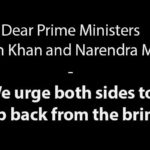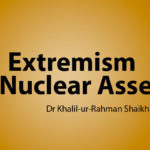By Shanta Roy
NEW YORK (IDN) – India, Pakistan and Israel, three countries armed with nuclear weapons, are not recognized as nuclear weapon states by the Nuclear Non-Proliferation Treaty (NPT) – a “privilege” bestowed only on the world’s five major nuclear powers: the U.S., UK, Russia, France and China, which are also members of the Nuclear Suppliers Group (NSG)
But in a report titled “António Guterres backs India’s coveted NSG membership”, the New Delhi-based Economic Times said “India has received a shot in the arm for its civil nuclear program from the UN, with Secretary-General António Guterres announcing support for Delhi’s NSG membership in his meeting with Prime Minister Narendra Modi” (on August 25).
Asked to confirm the Secretary-General’s endorsement of India’s membership in the NSG, UN deputy spokesperson Farhan Haq told IDN: “No, that topic was not discussed in their meeting.”
But the report of India’s membership in the NSG has triggered concerns from several nuclear experts.
Jayantha Dhanapala, a former Sri Lankan Ambassador and UN Under-Secretary-General for Disarmament Affairs, told IDN India is a de facto nuclear weapon armed country but NOT DE JURE i.e. India is not a Nuclear weapon state in the eyes of the NPT like the U.S., UK, Russia, France and China.
“Thus, it is denied facilities that NPT recognized nuclear weapon states enjoy. Once it gets into the Nuclear Suppliers Group, it is legitimate,” he said.
The NPT, he pointed out, recognizes only five Nuclear weapon states. Israel does not admit that it has nukes.
“Of course, the NPT reflected the status quo at the time it was signed. India chafes over this and tries hard to gain recognition as a nuclear weapon states to belong to the Big Boys Club,” said Dhanapala.
Dr M.V. Ramana, Simons Chair in Disarmament, Global and Human Security and Director at the Liu Institute for Global Issues at the University of British Columbia, told IDN regardless of the veracity of the Indian Prime Minister’s claim about having brought up membership in the NSG with the UN Secretary-General, there are two points that need emphasis.
First, the Secretary-General cannot really do anything about this. The NSG is a cartel that controls trade in nuclear fuel and technology and it operates by consensus. So all of its 48 members have to agree to any such decision (https://www.armscontrol.org/factsheets/NSG).
There is little chance of such consensus at the moment. So, the Prime Minister’s alleged talk with the Secretary-General is just a way to garner some publicity and a way to deflect pressure on India to curb its carbon emissions, said Dr Ramana.
Second, membership of the NSG will have no impact on India’s nuclear energy program. Thanks to a waiver that NSG members agreed to in 2008, India can already import nuclear reactors and uranium, he pointed out.
“The reason that nuclear energy is such a small fraction of India’s electricity generation—around 3 percent—is because nuclear plants are hugely expensive.
Indeed, imported nuclear power plants are even more expensive than domestically designed ones. So, more imports will only make electricity more costly,” Dr Ramana declared.
According to the Washington-based Arms Control Association (ACA), the NSG, established in 1975, is comprised of 48 states that have voluntarily agreed to coordinate their export controls to non-nuclear-weapon states.
The NSG governs the transfers of civilian nuclear material and nuclear-related equipment and technology.
The participants include: Argentina, Australia, Austria, Belarus, Belgium, Brazil, Bulgaria, Canada, China, Croatia, Cyprus, Czech Republic, Denmark, Estonia, Finland, France, Germany, Greece, Hungary, Iceland, Ireland, Italy, Japan, Kazakhstan, Latvia, Lithuania, Luxembourg, Malta, Mexico, Netherlands, New Zealand, Norway, Poland, Portugal, Romania, Russia, Serbia, Slovakia, Slovenia, South Africa, South Korea, Spain, Sweden, Switzerland, Turkey, Ukraine, the United Kingdom, and the United States.
The NSG aims to prevent nuclear exports for commercial and peaceful purposes from being used to make nuclear weapons.
In order to ensure that their nuclear imports are not used to develop weapons, NSG members are expected to forgo nuclear trade with governments that do not subject themselves to confidence-building international measures and inspections, according to ACA.
Alice Slater, who serves on the Board of Directors of World BEYOND War and is the UN NGO Representative of the Nuclear Age Peace Foundation, told IDN the support for India’s membership in the Nuclear Suppliers Groups is a great disservice to the already damaged integrity of the NPT.
The 1970 NPT which requires the existing nuclear weapons states at that time – US, Russia, UK, France, China – to make good faith efforts for nuclear disarmament, in return for a promise from the non-nuclear weapons states not to acquire nuclear weapons was joined by all the countries of the world except for India, Pakistan, and Israel, who then went on to build nuclear arsenals of their own.
The NPT provides that its non-nuclear weapons states parties be given peaceful nuclear power in return for their promise not to acquire nuclear weapons.
But it is very clear, that the sharing of nuclear technology for peaceful purposes is only available to parties who have joined the Non-Proliferation Treaty, said Slater, who is on the Board of the Global Network Against Weapons and Nuclear Power in Space, the Global Council of Abolition 2000, and the Advisory Board of Nuclear Ban-US.
The intended purpose of the NSG, which is to control the sale of dual-use nuclear technology, has created nothing more than a leaky sieve to compensate for the fatally flawed NPT which authorizes an “inalienable right” to non-nuclear weapons states to acquire the keys to their own bomb factories in the form of so-called “peaceful nuclear power”.
The new exception NSG is creating, by allowing a non-member of the NPT to join, deals a grave blow to the already limited integrity of the Non-Proliferation Treaty which has failed to enforce the promise given by the nuclear weapons states parties for nuclear disarmament, she added.
Tariq Rauf, Director of the Disarmament, Arms Control and Non-proliferation Programme at the Stockholm International Peace Research Institute (SIPRI), told IDN: First of all, this report in the Indian media has been denied by the UN in New York. “I suspect that the Indian media gave a spin to the matter. This is not new, in the past Indian media have reported either falsely, deliberately in my view; or given a positive spin regarding international support for India’s membership in the NSG. Whether this is directly or indirectly supported by the Ministry of External Affairs is open to question,” he said.
Second, in his opinion, it should be understood that it is beyond the authority and mandate of the United Nations or the IAEA, or any other international organization, to endorse or oppose membership of any Member State in self-appointed groupings such as the NSG, or MTCR, or Wassenaar Arrangement or the Australia Group.
These self-styled export control groups, respectively for nuclear, missiles, conventional and chemical/biological goods, are not subject to the UN Charter, have not been endorsed by the UN General Assembly; and in the case of the NSG, it has not been endorsed by the NPT States Parties through agreed outcome documents of Review Conferences or by the IAEA General Conference, he added.
Though the IAEA publishes NSG guidelines in the form of Information circulars (INFCIRC/254), these documents are merely for information and INFCIRCs can be requested to be circulated by any IAEA Member State and they have no legal standing, said Rauf, a former Senior Advisor to the Chair of the Disarmament Committee at the 2015 NPT Review Conference and Head of the Verification and Security Policy Coordination Office at the International Atomic Energy Agency (IAEA) and served as the Agency’s Point-of-Contact to the NSG.
Third, NSG member States, calling themselves PGs for participating governments, are in violation of they own guidelines and policies when in 2008 under tremendous pressure and bullying by the Bush administration agreed to give India a “waiver” to NSG guidelines and allow trade in nuclear items with India.
Among the conditions imposed on India were to: (a) separate military and civilian nuclear facilities and place the latter under IAEA safeguards, implement the IAEA Additional Protocol and enact export control domestic legislation, he added.
“India sent the IAEA a list of 22 current and to be constructed civil nuclear facilities to be put under item-specific (not comprehensive safeguards), but excluded all heavy-water (CANDU copy) reactors built by India that can be used to generate plutonium, as well as a plutonium reprocessing facility; and made acceptance of safeguards conditional on receiving foreign nuclear cooperation. If there is no such cooperation, then no safeguards,”
Also, he pointed out, the NSG “waiver” was and is in violation of NPT 1995 and 2000 agreement by consensus not to engage in nuclear cooperation with a State that is not a NPT non-nuclear-weapon State with full-scope (comprehensive) safeguards in place.
Fourth, the 2008 NSG waiver did not recognize nor legitimize India as a nuclear armed State, it merely allowed for trade in nuclear items. But India could well give it such an interpretation, which it has.
Fifth, both India followed by Pakistan have formally applied for NSG membership, many NSG PGs are inclined to admit India but not Pakistan, he noted.
Rauf said China and Turkey have held up consensus in the NSG on Indian membership, arguing that either both or none are admitted. If India gets in, it can deny consensus for Pakistan getting in.
The NSG continues to struggle with this matter. The NSG has been looking at a “criteria-driven approach” regarding admittance of new members, but some PGs are opposed to such an approach as they want to retain the option to deny membership even if a State fulfills the criteria as these PGs may oppose on political grounds.
“It is highly regrettable that NSG PGs are not inclined to make adherence by membership candidates to the CTBT (Comprehensive Nuclear-Test-Ban Treaty) a requirement, even though the PGs themselves have signed the CTBT (but not all have ratified, such as China and the U.S.),” he declared. [IDN-InDepthNews – 05 September 2019]
Image credit: Defence Squad | YouTube
IDN is flagship agency of the International Press Syndicate.
www.facebook.com/IDN.GoingDeeper – https://twitter.com/InDepthNews
Source: https://www.indepthnews.net/index.php/the-world/asia-pacific/2950-un-denies-endorsement-of-india-in-nuclear-suppliers-group


